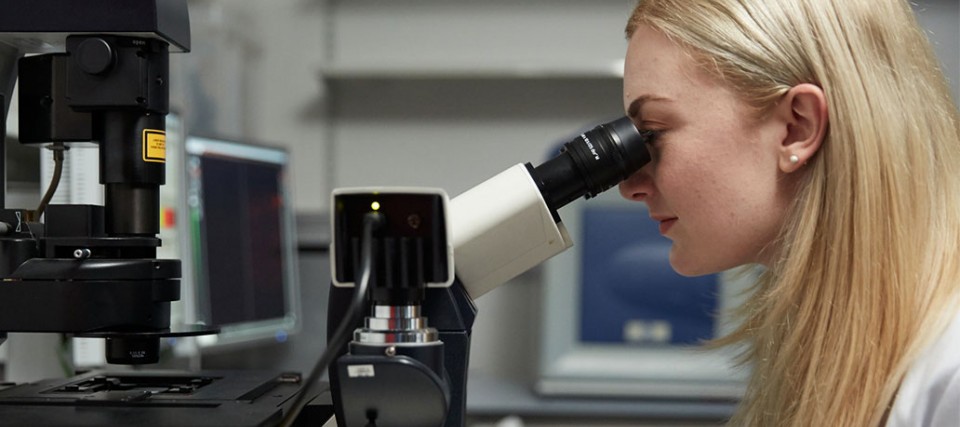
Cardiovascular science research study
Project summaries and contacts for our self-funded studentships - one of the routes to gain an MSc or PhD qualification.
About our studentships
We invite applications to study for MSc by Research or PhD.
Investigation of the effects of interferon alpha on endothelial cell activation, inflammation, pro-fibrotic gene expression and markers of endothelial-mesenchymal transition
-
Vacant until filled
Hypothesis: Interferon alpha contributes to systemic sclerosis progression through modulation of endothelial function.
Interferon alpha (IFNα) plays a significant role in the pathogenic signalling cascade involved in systemic sclerosis and systemic lupus erythematosus progression. However, the involvement of the endothelium in IFNα-mediated disease progression has not been established.
The effects of IFNα on endothelial biology are yet to be systematically studied. To address this, we will perform a transcriptomic assessment of the effects of IFNα on changes in gene expression and modulation of TGFβ signalling.
We will perform this analysis after adapting primary human coronary artery endothelial cells (HCAECs) to physiological flow to model the straight sections of the artery oscillatory flow experienced at arterial branch points. These are prone not only to atherosclerosis development but permissive to endothelial to mesenchymal transition.
We will use our well-established in vitro models and protocols to achieve this. Expansion of this project to include whole-cell proteomics and phospho-proteomics prepared in parallel samples will identify all of the interferon-regulated signalling effects in endothelial cells.
We will process data using our standard in-house bioinformatic pathway, and validate the findings by immunofluorescence staining, qPCR and western blotting.
We will focus on examining cytokine, adhesion molecule and pro-fibrotic signalling/extracellular matrix, in addition to the disease-associated GWAs related genes in our genomics and biomolecular studies project.
Markers of endothelial-mesenchymal transition will be quantified to determine if this phenomenon is likely to contribute to systemic-sclerosis-associated intimal hyperplasia.
Contact us
To get further details and make an informal study enquiry, you can contact Dr Steve White.
Biochemical and structural characterisation of the Oxidative Stress-Induced Growth Inhibitors (OSGIN) 1 and 2
- Vacant until filled
Despite the observation that endothelial erosion of atherosclerotic plaques is the underlying cause of up to one-third of acute coronary syndromes (ACS), there is a knowledge gap in its molecular mechanism. As a result, studying the mechanism of endothelial erosion is crucial to driving the development of therapeutic interventions in ACS.
This project focuses on the oxidative stress-induced growth inhibitors (OSGIN) 1 and 2 that are emerging players in the regulation of endothelial erosion. However, information on their molecular mechanism is missing. Biochemical and structural studies using recombinant protein can close this gap.
In this project, you will work at the cutting edge of molecular medicine and learn recombinant protein expression and purification techniques by expressing recombinant OSGIN1 and OSGIN2.
Depending on progression, it is anticipated that this project will include initial protein crystallisation trials.
This project will particularly suit someone looking for a career in research or industry, where protein purification is highly valued, and is willing to invest their time in a high input and high gains project.
Contact us
To get further details and make an informal study enquiry, you can contact Dr Steve White and Dr Mareike Posner.
Genomics and biomolecular studies of atherosclerosis in vascular disease
- Vacant until filled
Genetics, and very recently epigenetics in large population studies, have found a number of genes associated with atherosclerosis in stroke patients. However, the reason for these associations remains unknown in most cases.
To understand the biological mechanisms associated with atherosclerosis, we need to analyse the effect of these genes using different approaches including in silico data, cellular models or transcriptomics. For example, in silico approaches, we can use bioinformatic platforms such as Gtex or ONTIME to determine the associations of genetic variations with gene expression and protein levels.
As a research student, you will perform genome and epigenome-wide bioinformatic analysis and functional analysis, to understand the mechanisms of atherosclerosis with the main objective to find potential drug targets or new treatments.
You will learn the following techniques and processes:
- bioinformatic complex analysis such as genome-wide association studies (GWAs) and epigenome-wide association studies (EWAs) in large cohorts of patients to find new genes associated with atherothrombotic ischemic stroke
- bioinformatic tools such as MTAG analysis combining different traits to find new genetic risk factors
- a wide range of molecular biology techniques to understand the association between atherothrombotic stroke, established genes and those new genes found during the project
- different cellular models mimicking vascular processes
- drug-repositioning approaches to find potential new treatments for stroke
- complex cell models
Expected outcomes include:
- finding new genes associated with atherothrombotic stroke
- the analysis of new and previously known genetic and epigenetic variations associated with atherothrombotic stroke to understand the association with stroke
- finding potential new drug targets with the data generated during the project
Supervisors
Contact us
To get further details and make an informal study enquiry, you can contact Dr Steve White and Prof Jurek Krupinski.
